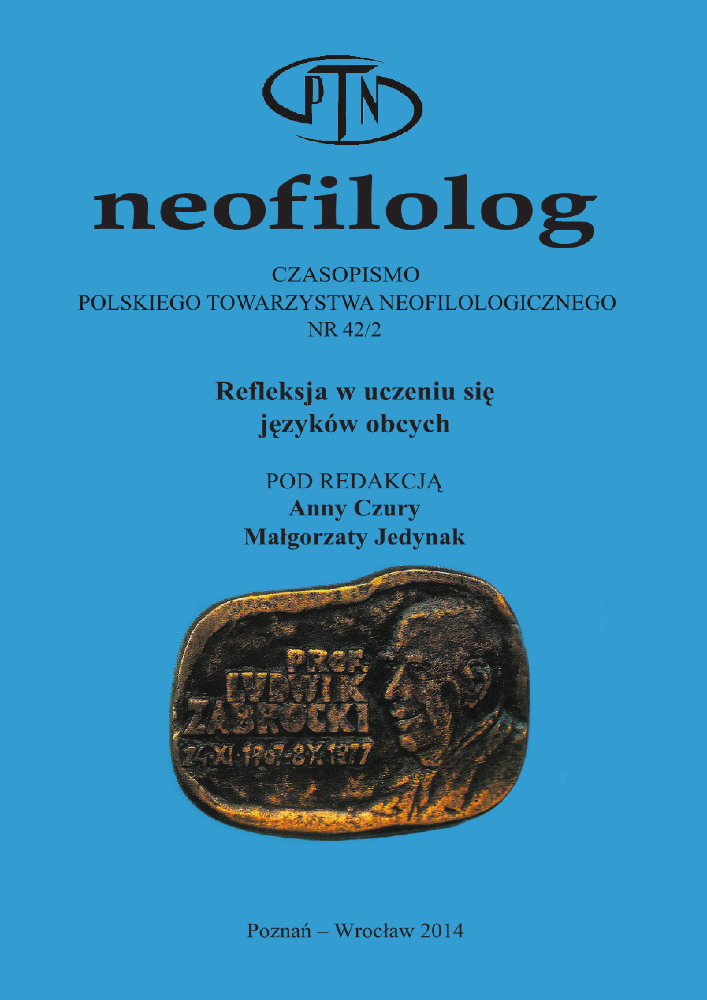Abstract
This article examines various levels of reflection in language learning and teaching, such as reflecting on one’s own foreign language production, on the language system in general, on one’s learning habits and, in the case of the teacher, on the teaching process. The author hypothesizes that all of these are bound to change some of their characteristics depending on features such as age of the learner and learning context. The article examines reflection in adult students of commercial language courses, trying to point out that all the levels of reflection mentioned are supposed to increase in this group. Age is proved to increase language-focused reflectivity in the subjects, whereas the specific learning context might, for reasons of strong personal motivation, be an asset in encouraging learner reflections on their own learning strategies. These conclusions are nonetheless to be treated with caution, for some specific inhibitors to reflection might appear in this group as well, and further research is needed to confirm this possibility.Literaturhinweise
Berthoud, A. C. 1982. „La relative fiabilité du discours métalinguistique des apprenants”. Encrages, Enseignement, Recherche: théories et pratiques 8/9: 139-142.
Bouchard, R., de Nuchèze, V. 1987. „Formulations métalangagières et situations exolingues” (w:) S’approprier une langue étrangère (red. H. Blanc, M. Le Douaron, D. Véronique), Paryż: Didier Erudition: 55-62.
Choy S. Ch., Oo P. S. 2012. „Reflective thinking and teaching practices: A precursor for incorporating critical thinking into the classroom?”. International Jour-nal of Instruction 5(1): 167-182.
Culioli, A. 1968. „La formalisation en linguistique”. Cahiers pour l’analyse 9: 106-117.
Dassier, J.-L. P. 2001. „Rôles de la communication et de la grammaire pour les novices du français langue étrangère”. The French Review 74(4): 686-697.
Holster, J. 1986. Student Autonomy in Adult Classes, Manchester Monographs 05/86.
Huot D., Schmidt R. 1996, „Conscience et activité métalinguistique. Quelques points de rencontre”. Acquisition et interaction en langue étrangère 8. http://aile.revues.org/1237 DW 24.07.2013.
Kierczak A. W., Sitko A. 2004. „Autonomia ucznia a nauczanie języka specjalistycznego, czyli czy wprowadzać autonomię na lektoratach?” (w:) Autonomia w nauce języka obcego (red. M. Pawlak), Poznań-Kalisz: UAM: 149-159.
Krashen, S. D. 1982. Principles and Practice in Second Language Acquisition. Oxford: Pergamon Press.
Michońska-Stadnik, A. 2013. Teoretyczne i praktyczne podstawy weryfikacji wybranych teorii subiektywnych w kształceniu nauczycieli języków obcych. Wrocław: Wydawnictwo Uniwersytetu Wrocławskiego.
Minott, M. A. 2011. „The impact of a course in reflective teaching on student teachers at a local university college”. Canadian Journal of Education 34(2): 131-147. http://ojs.vre.upei.ca/index.php/cje-rce/article/view/530 DW 24.07.2013.
Myczko, K. 2004. „Kognitywna teoria uczenia się i rozwijanie autonomii ucznia w dydaktyce języków obcych” (w:) Autonomia w nauce języka obcego (red. M. Pawlak), Poznań-Kalisz: UAM: 19-30.
Silcock, P. 1994. „The Process of Reflective Teaching”. British Journal of Educational Studies 42(3): 273-285. http://www.jstor.org/stable/3121886 DW 15.07.2013.
Tokarski, J. (red.) 1980. Słownik wyrazów obcych. Warszawa: PWN.
Trevise, A. 1996 „Réflexion, réflexivité et acquisition des langues”. Acquisition et interaction en langue étrangère 8, http://aile.revues.org/1223 DW 05.06.2013.
Turula, A. 2004. „Czy warto siać? – autonomia na kursach językowych dla dorosłych” (w:) Autonomia w nauce języka obcego (red. M. Pawlak), Poznań-Kalisz: UAM: 285-289.
Vasseur, M.-T., Arditty, J. 1996. „Les activités réflexives en situation de communication exolingue: réflexions sur quinze ans de recherche”. Acquisition et interaction en langue étrangère 8, http://aile.revues.org/1245 DW 24.07.2013.
Lizenz
Copyright (c) 2019 Dorota Pudo

Dieses Werk steht unter der Lizenz Creative Commons Namensnennung - Keine Bearbeitungen 4.0 International.
Autoren:
Die Autoren der zur Veröffentlichung in der Zeitschrift Neofilolog angenommenen Texte sind verpflichtet, den Vertrag über die Erteilung einer kostenlosen Lizenz für die Werke mit der Verpflichtung zur Erteilung einer Sublizenz CC auszufüllen, zu unterzeichnen und an die Adresse der Redaktion zurückzusenden.
Gemäß Vertrag erteilen die Autoren auf die in der Zeitschrift Neofilolog veröffentlichten Texte der Adam-Mickiewicz-Universität in Poznań eine nicht exklusive und kostenlose Lizenz und erlauben die Verwendung der Sublizenz Creative Commons Attribution-NoDerivatives 4.0 International (CC BY-ND 4.0).
Die Autoren behalten das Recht zur weiteren freien Verfügung über das Werk.
Benutzer:
Interessierte Onlinebenutzer dürfen die seit 2017 veröffentlichten Werke unter folgenden Bedingungen nutzen:
- Anerkennung der Urheberschaft - die Verpflichtung, zusammen mit dem verbreiteten Werk Informationen über die Urheberschaft, den Titel, die Quelle (Links zum Originalwerk, DOI) und die Lizenz selbst bereitzustellen;
- ohne Schaffung abgeleiteter Werke - das Werk muss in seiner ursprünglichen Form erhalten bleiben, ohne Zustimmung des Autors dürfen keine Studien, beispielsweise Übersetzungen, verbreitet werden.
Die Urheberrechte aller veröffentlichen Texte sind vorbehalten.
Sonstige:
Die Adam-Mickiewicz-Universität in Poznań behält das Recht auf die Zeitschrift als Gesamtheit (Layout, Grafik, Titel, Umschlagsprojekt, Logo usw.).
